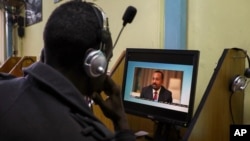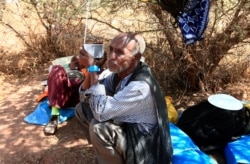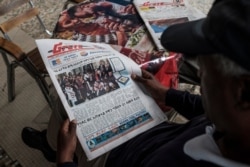As fighting erupted in the Ethiopian region of Tigray in early November, the northern part of the country was cut from internet, mobile phone and landline communications. Journalists say the government-imposed blackout made it virtually impossible to get accurate information about the conflict.
“We’ve had journalists, publication houses speaking out and saying that essentially it’s incredibly difficult to document what's happening on the ground,” said Muthoki Mumo, the Committee to Protect Journalist’s sub-Saharan Africa representative. “Because you’re unable to contact sources, it's difficult to verify what you're hearing, and it's in this kind of environment where the work of journalists becomes difficult, perhaps where you might even see misinformation going unchecked.”
At crucial moments such as the push in recent days by the Ethiopian military to retake the northern city of Mekelle, news outlets were unable to verify basic information. Exact numbers of casualties remain elusive.
The federal government said the Tigray incursion is a limited military action against some members of the Tigray People’s Liberation Front (TPLF) after it attacked a military base. But the TPLF calls it a war against Tigray, one that its forces continue fighting.
Federal forces said they had retaken the airport in Mekelle and a key military post while avoiding civilian casualties. TPLF said there were widespread civilian casualties and that federal forces were shelling the city center. The government says it is now in control of the region and has declared victory.
But due to blackouts and curbs on reporting, major news outlets run disclaimers saying they cannot independently verify claims.
“The jobs that journalists do are most crucial at moments like this,” Mumo said. “It’s at moments like this that we must be jealously guarding the gains that we’ve had in freedom of the press ... we need journalists shining a light on what’s going on.”
Not first blackout
This is not the first time the Ethiopian government has switched off communication when tension flared in the country. In 2019 there were widespread communications blackouts following a coup attempt in the Amhara region. In June of this year, the government shut down the internet in the Oromo region following the killing of a well-known singer, Hachalu Hundessa, whose death led to clashes.
Despite the central government’s tight control of the internet and communications infrastructure, it said the blackout in Tigray was conducted by the Tigray regional government.
“We [the Ethiopian government] are not the one who have cut the telecom connectivity in Tigray,” Ethiopia’s minister in charge of democratization, Zadig Abraha, told the German public broadcaster Deutsche Welle. “It is the TPLF that cut the telecom connectivity, with the view to keep the Tigrayan people incommunicado from the rest of the world so that they would continue to be fed from the false TPLF propaganda. Now we are working with the experts to reconnect the telecom connectivity, and in some places, it has already been restored.”
The government also tried to control the flow of information from Tigray by arresting journalists.
According to Reporters Without Borders, at least six journalists were arrested in the first week of the conflict. One of those arrested, Medihane Ekubamichael, contracted COVID-19 while behind bars.
“It’s unclear why these individuals are being detained,” she said. “The lack of transparency is something that is unacceptable. At the very least family, colleagues, lawyers should be made aware immediately why an individual journalist has been arrested.”
Chilling effect
Reporters in the country say the crackdown has included in-person and online harassment of journalists and is having a chilling effect on the ability of the media to freely and accurately cover the conflict.
“Whenever any of our colleagues are arrested, we don’t care if that person is [a person from Tigray] or Oromo, we see them as an Ethiopian. We see them as colleagues,” said Samuel Getachew, an Addis Ababa-based journalist with The Reporter newspaper. “Any good society should leave the media alone because it’s an important institution.”
Samuel is concerned that Ethiopian journalists will leave the profession, making way for foreign journalists to mostly cover the news.
“When passionate people leave the media, it ends up being [public relations], mostly Chinese companies implementing their ideas and pushing us to be like them,” he said. “There’s nothing wrong with being like China, but many of us prefer to be like Ethiopia. We might take different ideas from here and there, but we are passionate. I mean we are born here.”
Samuel urged the international community not to give up on Ethiopian journalism and Ethiopian progress. He said over the last two years he was fortunate enough to cover positive stories about reforms in the country.
“I think many of us were tired of reporting sad stories about Ethiopia forever,” Samuel said. “And we were beginning to see hope. And I hope that hope will come back because the last two years since 2018, with the exception of this year, was, I think, the greatest Ethiopian years I have seen in my generation.”


